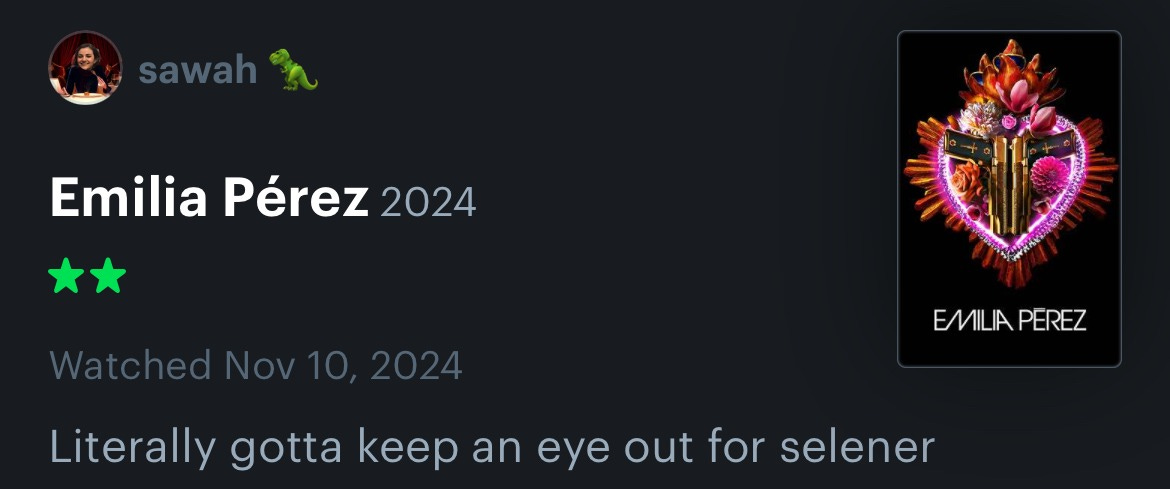on emilia pérez
the French-made Spanish-language trans crime musical drama everyone is talking about!
The first note in my phone is “feels like a weird Broadway musical.” That’s fitting for something that is listed as a “Spanish-language French musical crime film” - what sounds like a word salad-soup yet kind of actually works?
I picked Emilia Pérez as one of the first on my Oscars watch list mostly because I hadn’t heard great things and wanted to get it out of the way. Some of the critiques I heard proved true - that it isn’t especially lyrically profound, with lines like “I feel a feeling” and an entire number I would only imagine could be nicknamed “the sex change operation song.” Perhaps the music is more meaningful in its original language, as I am the stereotypical American who has a preschool-level understanding of French at best. Dance, however, is universal, and the wheeling hospital beds of La Vaginoplastica and the table dancing of El Mal feel as campy as the Barbie movie’s I’m Just Ken. That doesn’t mean it’s a bad thing, but considering the darker subject matter it feels strangely humorous and a little out of place. Crazy Ex-Girlfriend handles heavy themes and still manages to make large Broadway-style musical numbers work, but clearly knows its audience and wasn’t gunning for the television-equivalent of Best Picture - I think Emilia Pérez wants its nomination cake and eat it too. Letterboxd user comrade_yui said it best in their review: “what emilia pérez offers is not meaning, but the sensation of supposedly meaningful things moving in rapid succession, and it hopes the resulting blur will pass by quick enough that we do not notice the superficiality of its style -- in other words, a perfect film for awards season.”
To also echo the popular opinion, I wasn’t particularly a fan of Selena Gomez in the role of Jessi. Where Zoe Saldaña and Karla Sofía Gascón have unending chemistry and feel so tangible and nuanced and human, Selena Gomez’s Jessi feels a little, to quote the Tiktok trend, “um, and [s]he’s there.” I can’t speak on the complaints of her accent as I have no knowledge of if she sounds good or not (best I can do is ask for gum in Spanish) but perhaps I’ve seen one too many episodes of Only Murders in the Building and Wizards of Waverly Place and can’t seem to separate her face and disinterested countenance from the Selena Gomez™️ of it all. I don’t think the filmmakers helped their cause by having her perform Mi Camino karaoke-style, holding the microphone and dipping back as if she was on stage at the Revival Tour. She wasn’t bad, but as the Jessi character serves the best manifestation of an antagonist that we see in the film, I think the role could have gone to someone that wouldn’t be so jarring - I quite literally expected her lover Gustavo to end up being Benny Blanco. (We’re also not going to discuss that line. She should have just referenced A Year Without Rain and left it at that.)
Despite the wobbly tone and questionable lyrics and an attempt at being both gritty and Broadway-esque, I enjoyed Emilia Pérez a lot more than I expected. Whether that’s the success of the film or the fact my expectations were meager, I can’t be quite sure. I loved Zoe Saldaña as Rita and Karla Sofía Gascón as the titular Emilia but have a hard time feeling completely positive towards the film after the tweet controversy that, to quote a Netflix executive, “really is a bummer.” This could have been such a wonderful opportunity to honor a trans actress and trans story, but the (rightful!) controversy has stained my enjoyment of the film and quite literally erased Karla Sofía Gascón from the Oscar campaign. It would, indeed, be a “bummer” if the first trans actress to win Best Actress wasn’t present at the awards because of her deeply uneducated and offensive twitter rants. How’s that for history, kids?
And yes, I was feeling pretty good about myself as the credits rolled, patting myself on the back for going in with a quasi-open mind and ending up rather tickled instead of annoyedly vindicated (see, I told you so I had previously said to myself, seething and utterly bored to tears last year by back-to-back Oppenheimer and Killers of the Flower Moon viewings.) So imagine my surprise when I do my traditional after-movie routine of searching up reviews to see what others thought, and I was met with criticism on furious criticism of how horribly offensive the movie was. I was no stranger to the tweet controversy, or the Selena Gomez casting controversy, or the bungled Spanish controversy, or even the smack a yellow filter on the scenes set in Mexico to make it Mexico but it was actually shot in France controversy, but what I hadn’t considered was the vehemently negative reaction from the trans community. I wanted to like this film! I rooted for Emilia! But to paraphrase Victoria Justice: “um, I think we all [could be better trans allies.]”
See, you hear about a film that tells the story of a trans woman being nominated for thirteen gosh dang Oscars, one of which is the first ever Best Actress nomination for an openly trans actress, and you tend to think “wow! That’s great for the trans community!” But then you start to reflect on the film, how Emilia is misgendered almost immediately after asking Rita for assistance with her gender reassignment surgery, in the same breath of conversation about how she wants gender reassignment surgery. You look into the director, who is the straightest whitest French man in the history of straight white Frenchmen. You read about how he adapted the film from a novel (Écoute, by Boris Razon) because he felt the character wasn’t very fleshed out, and then proceeds to not really flesh the character out in the film, either — everything I feel for Emilia in the film comes from Karla Sofía, I’m sure of it. Even GLAAD condemned the film, so much so they wrote an entire statement on it. So how is it that Emilia Pérez can act as a compelling story with sympathetic characters while simultaneously vastly misunderstanding an entire community? I am not a member of the trans community and don’t want to speak over them, so I encourage you to read GLAAD’s statement and the many reviews from trans folks on Letterboxd and other film review platforms to understand the film and its flaws from a trans perspective, because there seems to be a massive gulf between the film and the community it is supposedly meant to be ‘uplifting’ - as Letterboxd user cerys put it: “trans Green Book.”
Despite the elaborate-verging-on-corny musical numbers, outcry over the plot, casting, and actors’ behavior, and the fact that the film forces Oscar voters to turn on their subtitles (mon dieu!), Emilia Pérez has garnered 13 Oscar Nominations - the most for any non-English language film - and recently won the BAFTA for Best Film Not in the English Language. For context, the 2020 Best Picture Parasite, the first non-English language film to ever win Best Picture, only received six nominations. Do I think Emilia Pérez should win Best Picture? I’m not sure — I think it depends heavily on the contenders, of which I have yet to see. But what I do know is that on its own, it’s worth watching (if only to laugh at Zoe Saldaña’s dance moves). But hey! That’s just my opinion.














There’s such a whiplash effect from “you need to see this movie to be a good person” to “how DARE you like that movie? You’re a bad person!”
And it think it effects our ability to watch things without having the discourse influence our feelings about it on a raw level. I haven’t seen this yet and probably won’t because I’m not a huge fan of musicals so musical with bad music? Not for me.
But I felt this way about Substance. The discourse was that it’s such a hugely IMPORTANT and NECESSARY film!
So I was disappointed. But it was well made and wildly inventive! If I had watched it without knowing the stuff around it, I think I would have liked it better?
Idk. But I liked your article!